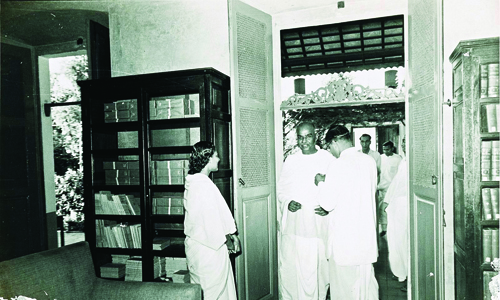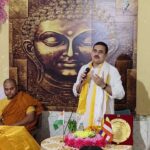Fervent, unfazed, undeterred
- By : Anirban Ganguly
- Category : Articles

Before his lonely and confined death on June 23, 1957 at the age of 52, in then faraway Srinagar – then Governor of West Bengal H.C. Mookerjee describing Syama Prasad’s death had said, ‘what has added to the poignancy of our grief is that he died in detention, while still seeking to serve the country according to his own lights, far away from his home and from his near and dear ones’ – Syama Prasad Mookerjee could have scarcely perhaps believed that one day the political entity –Bharatiya Jana Sangh – that he had formed against great odds and challenges would, in its transmuted avatar, become the ruling party of India with governments not only at the centre but in a number of states. Read This – Say no to plastics! He could not have anticipated for sure that his vision and deeper political objective of giving India a political alternative would eventually propel her in a new era. Or perhaps he could; his deep prescience and political instinct may have assessed the long term harvest in the form of an alternate political narrative that would eventually become the mainstream after years of ceaseless political struggle. Read This – Reinvent India’s trade pattern In fact, it is interesting to note that in his speeches and discourses on education, Syama Prasad often referred to the need to create ‘A New India’ based on her ancient and perennial civilisational values, the mainspring of her regeneration would have to be her cultural, civilisational and spiritual base, a base which has shaped, nurtured and sustained her fundamentals throughout the ages. As BJP president Amit Shah, often describes it, while Nehru and his worldview worked to create a new India divorced from her civilisational roots, Syama Prasad advocated the need to recreate ‘A New India’ based on her civilisational wisdom, ethos and philosophy, which he always argued, are self-renewing and forever evolving. His imprint on Indian politics, on Indian education, on the social issues of the day and on India’s struggle for emancipation was unmistakable, recognised and accepted. A forceful and indefatigable exponent of nationalist causes, a fundamental thinker and implementer- both educational and political, a bridge builder, a leading light for the beleaguered Hindus in Muslim League Bengal, a deft, efficient and remarkably performing Union minister in free India’s first cabinet, a nurturer of institutions – his support to and concern for Gurudev Tagore’s Visva-Bharati for example is an episode which has been forgotten and marginalised – a relief mobiliser during the excruciating famine of Bengal – in fact it was largely due to Syama Prasad’s efforts that the magnitude of the famine that had struck Bengal became known to the whole of India and to the wider world – a voice for the battered Hindus of East Pakistan, the creator of West Bengal as a space where the Bengali Hindu could live with dignity, freedom, security and democratic rights, a voice for opposition space and views in free India’s first parliament, when the Congress juggernaut under Nehru brooked no response, a crusader for India’s unity and integrity, Syama Prasad adorned many roles and causes, forever fervent, unfazed, undeterred in these many missions that he had undertaken during a short but dynamic political life, as a young statesman, who achieved eminence early in his career, almost a ‘political prodigy’, as one of his colleagues in the University of Calcutta described him in his tribute. Yet, except perhaps for the party he had founded and those who had worked directly with him, his legacy was never articulated in its entirety and in all fairness, it was deliberately confined and a concerted attempt made to marginalise, minimise and dilute the import of the many contributions he had made to our national life. Had it not been for Syama Prasad, had it not been for his dexterous and forceful advocacy for the need of a state for the Bengali Hindus, West Bengal would have never seen the light of day, subsumed into the dark recesses of Jinnah’s greater Pakistan, with its inhabitants consigned to a second class existence, facing discrimination and eventual annihilation. Not only did Syama Prasad convince the Congress and other leaders to support his demand, he succeeded in taking along and bringing on board a large number of leading minds of the era who rallied around in support of his call to save, at least, a portion of Bengal for being swallowed by Jinnah’s dark dream. Ironically his legacy has suffered most in West Bengal under various dispensations. So uncomfortable are some with Syama Prasad, that a leading Bengali daily, claiming to be the most widely read, a few months back used a photograph – that of Syama Prasad addressing a meeting outside parliament on the Kashmir issue – in a weak and confusedly written article, with the caption that the photo was of Syama Prasad holding a ‘rabidly Hindutva meeting.’ During the Left front regime, a deliberate miasma was created around Syama Prasad’s legacy, with the then dispensation refusing to celebrate his birth centenary. Among the Left leaders in that era, there were many who had barely managed to save themselves and had come over to West Bengal as refugees. Syama Prasad had come to their rescue and did for them what Marx and his gaseous philosophy could not. That neglect of Syama Prasad in West Bengal continues, he remains uncomfortable for a certain brand of politics which bases itself solely on the vote-bank arithmetic. But as the winds of nationalism blow, Syama Prasad rises again from the ashes of neglect…

















